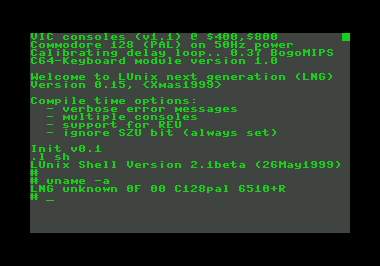LUnix
 | |
| Written in | assembly language |
|---|---|
| OS family | Unix-like |
| Working state | Historic |
| Latest release | 0.21 |
| Platforms | C64, C128 |
| Default user interface | CLI |
| License | GNU General Public License |
| Official website |
lng |
LUnix, short for "Little Unix",[1] is a Unix-like operating system designed to run natively on the Commodore 64 and Commodore 128[2] home computer systems. It supports TCP/IP networking (SLIP or PPP using an RS232 interface). Unlike most Unix-like systems, LUnix is written in 6502 assembly language instead of C.
The first version of LUnix was released in 1993, the current version 0.21 dates from 2004. Amongst others, it supports preemptive multitasking, Unix pipes, a variety of protocols like TCP/IP, SLIP, PPP and RS232, dynamic memory management and virtual consoles. It contains a web server and clients for telnet, POP3 and FTP and can act as a terminal or terminal server over RS232.
LUnix was developed by Daniel Dallmann and contributed by Ilker Ficicilar, Stefan Haubenthal and Paul Gardner-Stephen in late 1990s. The first generation LUnix had support for faster RS232 via clever software tricks, 80 column VIC and VDC screen support, PS2 keyboard support, and small set of standard Unix commands. It is possible with this first distribution to attach two keyboards and two monitors and one RS232 terminal to set up a 3 simultaneous, multitasking sessions on a C128.
See also
- OS-9 a multi-tasking operating system implemented in native code for the 6809 microprocessor.
- GeckOS a multi-tasking operating system for the 6502, offering binary compatibility with LUnix when linked to lib6502.
References
- ↑ "About LUnix", Retrieved on 2010-08-27
- ↑ "LUnix Sourceforge Homepage", Retrieved on 2010-08-28